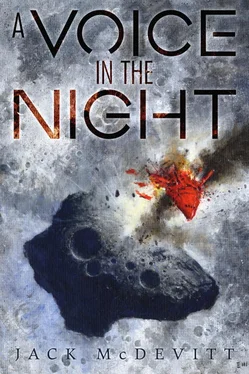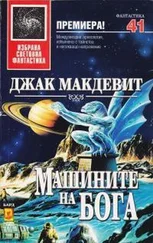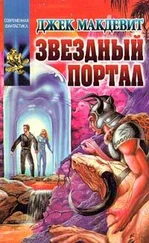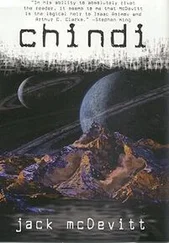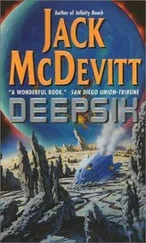“Not a good idea, Jake.”
“I told McIntyre where to head in at. Burned my bridges, I did.”
“Well, congratulations. I guess.”
“There’s more.”
Charlie was looking around for their waitress. “Yeah?”
“I’m going to the South Seas.” Charlie blinked. He was an easy guy to startle. “I’m going to set up on an island. Find a place with beautiful women and night music and just lie on the beach and throw coconut shells into the ocean.”
“I believe,” said Charlie, “I’ve heard this before.”
“This time I mean it.”
Charlie’s gaze dropped to the table. Jake became aware of pieces of conversation around him: an older couple haggling over money, three young executive-types laughing at the antics of an absent colleague, a middle-aged woman complaining about incompatible computer systems.
“You should always leave an escape hatch,” Charlie said. “If you change your mind, Baxter will cut you off at the pass. You’ll have trouble getting work anywhere.”
“The problem with escape hatches is that you always wind up using them. No: I’ve begun to think about what really counts in this world. And hanging around Philly in a job that just goes on and on: that isn’t it.”
“You sound like a beer commercial.”
Jake grinned. “Yeah. I know.”
“Jake.” Charlie’s eyes fastened on him. “You’ll go nuts out there. There’s nothing to do.”
“Sure there is. They have great luaus.”
“I’m talking about a job, Jake. And then, you know, a reason to exist.”
“Don’t need it, Charlie. Loaf of bread. Jug of wine. Couple of women. That’ll be enough.”
Charlie looked unhappy. “Who are you going to play poker with?”
“I’ll find someone.” Jake’s expression softened. “I was wondering if you’d like to come?”
“Me?”
“Why not? Hell, it’d be a great way to get away from the rat race. What do you say?”
Charlie’s brow furrowed. “I can’t do that.”
“Why not?”
“This is my home, Jake. Always has been.”
“That doesn’t mean you have to stay here. What’s holding you? Your kids are grown. You don’t like your job—”
“—But I’m only ten years from retirement.”
“Ten years. Charlie, that’s a lifetime. That job will kill you. You really going to stay that long with something you don’t like just because you have an investment in the pension fund? Come on—”
They paid up and walked out of the bar. The mall was jammed with Christmas shoppers. They stopped at Rollie’s newsstand to pick up a copy of Sports Illustrated . Jake remembered the times when he and Charlie and the rest of the Tasker Tornadoes, dragging bats and gloves and catcher’s equipment, had stopped here coming back from games in West Philly and Frankfurt. That was before they owned cars and had to ride the subways and elevated to get around. A lot of years ago.
Just ahead, Jake spotted a travel office tucked away in an alcove. “That’s new,” he said.
Posters of Asian and European city scenes covered the glass and the interior walls. Jake saw desert sunsets and jungle ruins and moonlit oceans. And a framed photograph of part of an orange disk was mounted in the center of the window. Bright silver fountains obscured the edges of the disk, and a black sky filled with stars was set behind it. “It’s the sun,” said Jake.
“I don’t think so.” Charlie leaned closer. “It looks like a photo.”
“Why isn’t it the sun?”
“Look down here.” He pointed at a quarter-sized sphere of bright golden light. “That’s a second star. No other stars around here.”
“That’s really clever.” Jake squinted. “You’re right.”
Inside, a small man in gray trousers and a white shirt sat at a desk behind an office-length counter. He was bent over a computer. His black hair had begun to thin, and he wore a red tie and bifocals. There was something basically prissy in his expression.
Jake pushed open the door.
The man with the bifocals continued to peer at the computer. Then without having seemed aware of their presence, he glanced up. “Good afternoon, gentlemen. What can I do for you?”
A rubber plant dominated his work table. On the wall behind the plant, Jake saw a photograph of an aircraft with filamented wings flying over a rough sea. The plane looked like one of those 1912 experiments that always went wrong. But this one appeared to be riding out a storm.
“Just looking around,” Jake said. There were several other pictures mounted on the walls, shots of landscapes and cities. “What kind of plane is that?”
“Name’s Kirby.” The man smiled weakly and offered his hand.
“Jake Cashman. This is Charlie Halvik.”
“And that,” Kirby indicated the aircraft, “is a Wyndsurf 18.”
“New kind of plane?”
“An old one.” Kirby adjusted his bifocals. “They’re only used now for sightseeing.” He looked toward Charlie and back at Jake. “May I be of assistance?”
Jake nodded. “Do you have information on the South Seas?”
“You mean traveling there? Of course.” He tilted his head in a way that seemed almost birdlike. “Would you be interested in a winter vacation possibly? We could plan an excellent one for you.”
“Well, I’d just like to get an idea what’s available. What the rates are. One-way.”
Kirby reacted with surprise. “One-way? You’re planning on a permanent move?”
“I’m considering it.”
“How many people would be traveling?”
“One,” Charlie said. Jake did not miss the reproach in his tone.
Kirby’s eyes moved from Jake to Charlie. “Please wait a moment.” He turned away, back to his keyboard.
Jake and Charlie looked at each other. “Don’t make any commitments now,” said Charlie.
“I won’t. I just want to start getting a feel for things.”
Kirby peered into his screen. “Best current fare into Truk, that’s in Micronesia, would be just under a thousand dollars. One way.”
“Not cheap,” said Charlie. “Why don’t you try Atlantic City?”
“On the other hand, Mr. Cashman, I can suggest a destination you might find interesting. And the price is right.”
“Where?” Jake asked.
“Just a moment.” Kirby opened a cabinet and produced a photo album. He glanced inside it, nodded to himself, turned it around, and opened it in the middle.
A single photograph, about the size of a sheet of stationery, was mounted in the center of the page. There was a beach in the foreground, a few pieces of driftwood, a line of waves, and an oddly-twisted seashell. Twin peaks dominated the skyline, one towering over thick black forest, the other rising out of the ocean. They were gray and polished, their tops snow-covered. It was late afternoon on a day somber with approaching rain. Jake could almost smell salt air.
“I think I’ve seen that somewhere,” said Charlie. “Is it in Maine?”
“It’s Coeli-namar. Sea Mount in English.”
A finger of mist curled up out of the forest. Streaks of sunlight fell across cold rock. Just below the snowline, Jake could make out a silver span connecting the two mountains. Maybe a thousand feet up. “What is that?”
Kirby twisted around to get a look. “A bridge,” he said matter-of-factly.
“A bridge?” There was no support, and the thing had to be two miles long.
“Yes.” Kirby nodded. “Isn’t it magnificent?” He started to turn the page.
“Just a minute.” Jake did not feel that he was looking at a photo. It might almost have been a living landscape.
Kirby adjusted his collar. “It lies somewhat beyond the routes of the commercial airlines.” Another photo revealed a house on stilts rising out of a moonlit lake, in which three crescents floated in the black polished water. The house appeared to be constructed of brass and fronds. Circular windows glowed along its upper level. Lanterns lined its decks. Jake could see several shadowy forms stretched out in chairs.
Читать дальше
